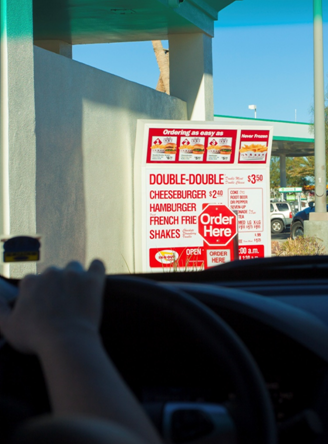In an increasingly option-filled world, consumers are looking for simplicity. They want the quickest means to making a decision.
A brand enables a purchase decision to be shortcut because it allows a judgment we’ve already made about a product or service to shape our current decision. You don’t have to compare the ingredients of every spaghetti sauce on the aisle each trip to the store, because you know you buy Ragù.
The question is, how broad does the modern consumer want a brand to be? Do we want Dyson to make TVs or Campbell’s to offer sparkling water?
Is there more simplicity in a single brand offering a wide variety of products or in a brand that does one thing extremely well?
 Current trends show a consumer who is more comfortable accepting brands with a narrow focus. Think Yeti or Tesla or the five-item menu of In-N-Out Burger.
Current trends show a consumer who is more comfortable accepting brands with a narrow focus. Think Yeti or Tesla or the five-item menu of In-N-Out Burger.
Part of the reason behind this is the “appification” of consumer behavior. As sophisticated consumers have become accustomed to having a specialized app (read: brand) for each task, they have been trained to think specialist brands provide the best experience. Evernote, Instagram, Pandora—all brands delivering a singular, focused experience that consumers love. 
The surprising thing about this “appification” is that there appears to be enough brand loyalty to go around. There was a time when one of the arguments for having an umbrella brand was consumers could only maintain so many brand loyalties, so put as much under that umbrella as you can and share the loyalty across diverse products. Think about how many things you have seen sporting the Craftsman logo when walking through a Sears (if you have done that in the last decade)—“this mechanical pencil must be built to last—it’s a Craftsman!” Instead, the modern consumer has shown they are willing to develop loyalty to multiple niche brands and actually ascribe more value to a brand willing to have a narrow focus.
Implications beyond consumer brands
It is easy to see the effect of this perception shift on consumer brands, but there are implications for a B2B brand considering a brand extension as well. When thinking about branding in the B2B space, it is important to remember that B2B decision makers are consumers too, and the brand selections they make every day color their perceptions of B2B brands as well.
In addition, B2B transactions often occur in more confined segments than consumer transactions; for example, enterprise accounting software or automated material conveyors. This reinforces the decision maker’s desire for a specialist brand. Even B2B brands that might be perceived as broad, such as Aramark or Oracle, still live within a fairly small slice of the overall B2B market.
Actions for the B2B marketer
- Serious thought should be given to any proposed brand extension to ensure it fits closely with the existing brand identity. If there is any doubt, fielding a small research study with current customers is a great way to test the fit of the potential brand extension with people who understand what your brand stands for now.
- In cases where your organization is considering entering another market or serving a group of users with different needs than your current customer base, a new brand should be considered. While there are additional costs involved in launching and supporting a new brand, they can be well worth it as buyers continue to be trained to choose the specialized brand.
- As a test of a proposed B2B brand extension, try explaining in two sentences or less why this brand extension is consistent with your current brand’s positioning statement. If you can’t explain the “Why us?” simply, it might be time to rethink the brand extension or start thinking about a multi-brand strategy.
Whether making a B2C or B2B branding decision, marketers are faced with the reality that the broad is less believable than it once was and a brand that feels niche (i.e., “we specialize so we can bring you the best”) wins more often than not.








